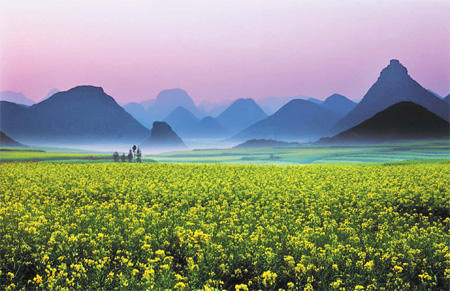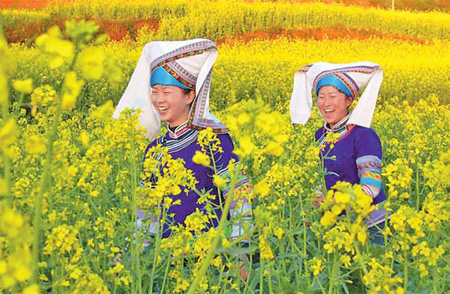Share Your Experience
Flower power
Updated: 2011-03-03 07:53
By Guo Anfei and Li Yingqing (China Daily)
|
Fields of blooming rapeseed flowers are bathed in the morning sunlight in Luoping, Yunnan province, which is known for its unique karst landscape. Hu Liangfu / for China Daily |
|
Two Bouyei women wander through the fields. Hu Liangfu / for China Daily |
 |
Vast swathes of rapeseed blooms have helped the economy of a previously destitute county in Yunnan blossom. Guo Anfei and Li Yingqing report.
While much of northern China was blanketed in snow in February, early spring had painted the fields of Yunnan province's Luoping county in brilliant yellow, as millions of rapeseed flowers bloomed.
Located on the borders of Yunnan, Guangxi and Guizhou provinces, Luoping has long lured tourists with its unique karst landscapes. The basins dimpling mountain ranges are inhabited by the Yi and Bouyei ethnic groups. But its biggest draw is its 430,000 hectares of rapeseed, said to comprise Southwest China's largest plantation.
Sprawling farmlands are covered with the flowers, which stretch to the horizon, filling the air with the refreshing smell of spring in early February.
Hordes of tourists from around the world flock to the county every year to enjoy spring's first exhalations. Some call it "the world's biggest garden", while others hail it as "a mecca for photographers".
Li Chunhua, a native of Nanyang city in Central China's Henan province, is one of the countless photographers who come here every spring.
"It's just nice and warm here," says Li, who came to Luoping this year with his wife and daughter.
He is pleased to have taken a plethora of high-quality photos. Those of his daughter clad in traditional ethnic attire and wandering through the flowers are "particularly beautiful", he says.
The local government has organized the annual Rapeseed Flower Festival from February to March since 1998 to encourage tourists.
Director of the county's tourism bureau, Liu Bo, says Luoping received more than 1.17 million tourists in 2010, when profits from the tourism industry reached 880 million yuan ($133.87 million).
The stream of tourists into the county over the past decade has brought transformation to the previously impoverished county.
"About a decade ago, some farmers were too poor to feed themselves," Liu says.
The tourism boom provided more job opportunities. Local farmers started small businesses, such as family hotels or ethnic handicraft production and retail.
"They don't need to worry about food and clothes anymore. Some built their own houses and bought tractors," Liu explains.
E-paper

Green light
F1 sponsors expect lucrative returns from Shanghai pit stop
Preview of the coming issue
Toy for rich boys
Reaching out
Specials

Share your China stories!
Foreign readers are invited to share your China stories.

No more Mr. Bad Guy
Italian actor plans to smash ‘foreign devil’ myth and become the first white kungfu star made in China.

Art auctions
China accounted for 33% of global fine art sales.


